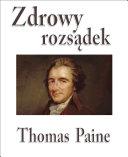Wiek rozumu (1794)
Dzieło

Zdrowy rozsądek
Thomas PaineThomas Paine słynne cytaty
„Uczestniczenie w dwóch rewolucjach oznacza, że życie ma pewien cel.”
w liście do George'a Washingtona (1789)
Źródło: Christopher Hitchens, Thomas Paine. Prawa człowieka. Biografia
o Wilhelmie Zdobywcy, odrzucając ideę władzy królewskiej i deprecjonując pochodzenie brytyjskiej monarchii.
Zdrowy rozsądek (1776)
Thomas Paine cytaty
Thomas Paine: Cytaty po angielsku
“The mind once enlightened cannot again become dark.”
Źródło: A Letter Addressed to the Abbe Raynal on the Affairs of North America
“Society is produced by our wants, and government by wickedness”
1770s, Common Sense (1776)
Kontekst: Society is produced by our wants, and government by wickedness; the former promotes our happiness positively by uniting our affections, the latter negatively by restraining our vices. The one encourages intercourse, the other creates distinctions. The first is a patron, the last a punisher. Society in every state is a blessing, but government even in its best state is but a necessary evil.
“A body of men, holding themselves accountable to nobody, ought not to be trusted by any body.”
Part 1.3 Rights of Man
1790s, Rights of Man, Part I (1791)
“From the errors of other nations, let us learn wisdom”
Źródło: Common Sense
“… taxes are not raised to carry on wars, but that wars are raised to carry on taxes”
Źródło: Rights of Man
“He who dares not offend cannot be honest.”
The Forester's Letters http://www.bartleby.com/184/117.html, Letter III—'To Cato', Pennsylvania Journal (24 April 1776)
1770s
“Reason obeys itself; and Ignorance submits to whatever is dictated to it.”
Part 1.7 Conclusion
1790s, Rights of Man, Part I (1791)
Kontekst: Reason and Ignorance, the opposites of each other, influence the great bulk of mankind. If either of these can be rendered sufficiently extensive in a country, the machinery of Government goes easily on. Reason obeys itself; and Ignorance submits to whatever is dictated to it.
Źródło: 1790s, The Age of Reason, Part II (1795), Chapter III: Conclusion.
“The World is my country, all mankind are my brethren, and to do good is my religion.”
Commonly attributed to Paine, even on memorials https://commons.wikimedia.org/wiki/File:Thomas_Paine_Plaque_NY.jpg|, and justly describes his ideals, but found nowhere in his writings. It is actually is derived from a quote in Rights of Man: Part 2, "My country is the world, and my religion is to do good."
Misattributed
“These are the times that try men's souls.”
Źródło: The American Crisis
Part 2.7 Chapter V. Ways and means of improving the condition of Europe, interspersed with miscellaneous observations
Źródło: 1790s, Rights of Man, Part 2 (1792)
Kontekst: I speak an open and disinterested language, dictated by no passion but that of humanity. To me, who have not only refused offers, because I thought them improper, but have declined rewards I might with reputation have accepted, it is no wonder that meanness and imposition appear disgustful. Independence is my happiness, and I view things as they are, without regard to place or person; my country is the world, and my religion is to do good.
The Crisis No. V
Źródło: 1770s, The American Crisis (1776–1783)
The Crisis No. IV.
1770s, The American Crisis (1776–1783)
Kontekst: Men who are sincere in defending their freedom, will always feel concern at every circumstance which seems to make against them; it is the natural and honest consequence of all affectionate attachments, and the want of it is a vice. But the dejection lasts only for a moment; they soon rise out of it with additional vigor; the glow of hope, courage and fortitude, will, in a little time, supply the place of every inferior passion, and kindle the whole heart into heroism.
Part 1.3 Rights of Man
1790s, Rights of Man, Part I (1791)
Kontekst: There never did, there never will, and there never can, exist a Parliament, or any description of men, or any generation of men, in any country, possessed of the right or the power of binding and controlling posterity to the "end of time," or of commanding for ever how the world shall be governed, or who shall govern it; and therefore all such clauses, acts or declarations by which the makers of them attempt to do what they have neither the right nor the power to do, nor the power to execute, are in themselves null and void. Every age and generation must be as free to act for itself in all cases as the age and generations which preceded it. The vanity and presumption of governing beyond the grave is the most ridiculous and insolent of all tyrannies. Man has no property in man; neither has any generation a property in the generations which are to follow.
“Toleration is not the opposite of Intolerance, but is the counterfeit of it. Both are despotisms.”
Part 1.3 Rights of Man
1790s, Rights of Man, Part I (1791)
Kontekst: Toleration is not the opposite of Intolerance, but is the counterfeit of it. Both are despotisms. The one assumes to itself the right of withholding Liberty of Conscience, and the other of granting it. The one is the Pope armed with fire and faggot, and the other is the Pope selling or granting indulgences. The former is church and state, and the latter is church and traffic.
